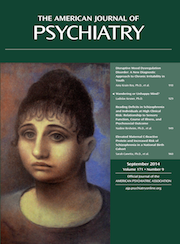Elevated Maternal C-Reactive Protein and Increased Risk of Schizophrenia in a National Birth Cohort
Abstract
Objective
The objective of the present study was to investigate an association between early gestational C-reactive protein, an established inflammatory biomarker, prospectively assayed in maternal sera, and schizophrenia in a large, national birth cohort with an extensive serum biobank.
Method
A nested case-control design from the Finnish Prenatal Study of Schizophrenia cohort was utilized. A total of 777 schizophrenia cases (schizophrenia, N=630; schizoaffective disorder, N=147) with maternal sera available for C-reactive protein testing were identified and matched to 777 control subjects in the analysis. Maternal C-reactive protein levels were assessed using a latex immunoassay from archived maternal serum specimens.
Results
Increasing maternal C-reactive protein levels, classified as a continuous variable, were significantly associated with schizophrenia in offspring (adjusted odds ratio=1.31, 95% confidence interval=1.10–1.56). This finding remained significant after adjusting for potential confounders, including maternal and parental history of psychiatric disorders, twin/singleton birth, urbanicity, province of birth, and maternal socioeconomic status.
Conclusions
This finding provides the most robust evidence to date that maternal inflammation may play a significant role in schizophrenia, with possible implications for identifying preventive strategies and pathogenic mechanisms in schizophrenia and other neurodevelopmental disorders.



